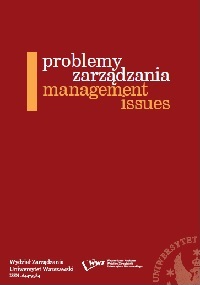Managers of Cultural Institutions and Their Importance for the Activities Related to Building the City Brand – Results of Qualitative Research
Managers of Cultural Institutions and Their Importance for the Activities Related to Building the City Brand – Results of Qualitative Research
Author(s): Wioletta KrawiecSubject(s): Culture and social structure , Rural and urban sociology, Marketing / Advertising
Published by: Wydawnictwo Naukowe Wydziału Zarządzania Uniwersytetu Warszawskiego
Keywords: city brand; manager; grounded theory; cultural institutions;
Summary/Abstract: Purpose: The article describes a model approach to the profile of cultural institution manager in the context of their involvement in building the city brand. The research also reveals soft organizational/ management skills, which can nowadays determine the effectiveness of actions for the city brand. Design/methodology/approach: The background of the research was the developed brand strategy of the City of Lodz (Brand Management Strategy for the years 2010–2016), which assumed the direction of building the city brand based on culture (cultural resources), new media and creative industry. The empirical basis is constituted by face-to-face interviews with managers and employees in the city’s cultural institutions in Lodz. Data analysis was carried out by the principles of grounded theory methodology. Findings: The analysis shows that the “psychological maturity – personality” of a cultural institution manager is more important in recognizing opportunities and threats in the environment than the “professional experience” of the manager. The “human personality” component allows for more skillful management of the city’s resource potential and for the search for positive and negative effects of action on the part of cultural institutions that have an impact on the creation of the Lodz city brand. Today’s managers are very committed and organized persons, able to observe and learn from their own mistakes and finding opportunities for development. They are managers who are aware of the opportunities offered by cultural institution involvement in activities for the city of Lodz and want to participate in such projects. On the other hand, they clearly see the consequences of lost benefits resulting from wrong decisions (e.g. the outflow of famous people, events, etc.). Despite a larger number of observed positive features of managers, the research revealed those with a negative strain, i.e. indifference, ignorance of tasks, helplessness, etc. Such behavior may result from communication and relationship problems between cultural institutions and the organizations to which they are subject. In the process of research, it could be observed that managers have very broad knowledge of different areas of life. This can also influence the perception of the environment and the accurate assessment of actions for the city brand. Research limitations/implications: This study is only of cognitive character in order to understand or discover a new trend. The interdependencies observed during the research are a just a small part and still need to be explored. The developed cultural institution manager profile is not the final version. This may change, which is also caused by the adopted research method – the grounded theory. Originality/value: The identified profile of the cultural institution manager can be helpful when employing appropriate specialists, taking into account the interests of cultural institutions and the city. In this way, it can contribute to more effective implementation of the brand strategy adopted by the city. The research results presented in the article are the effect of a systematic analysis of information collected and analyzed following the adopted research method, the so-called grounded theory.
Journal: Problemy Zarządzania
- Issue Year: 19/2021
- Issue No: 1 (91)
- Page Range: 146-164
- Page Count: 19
- Language: English

